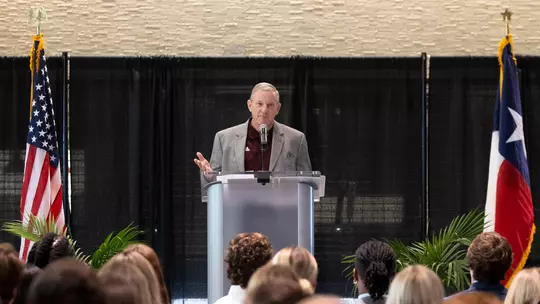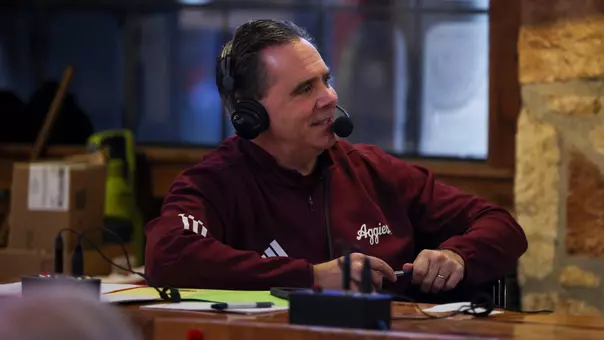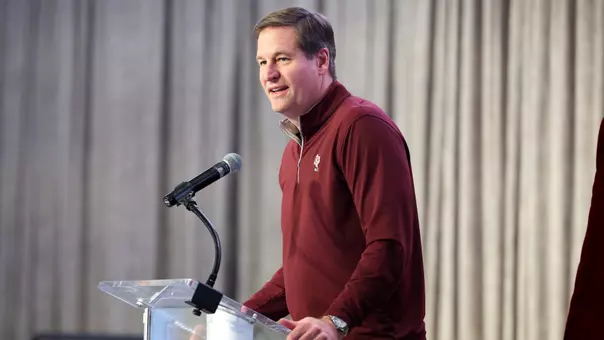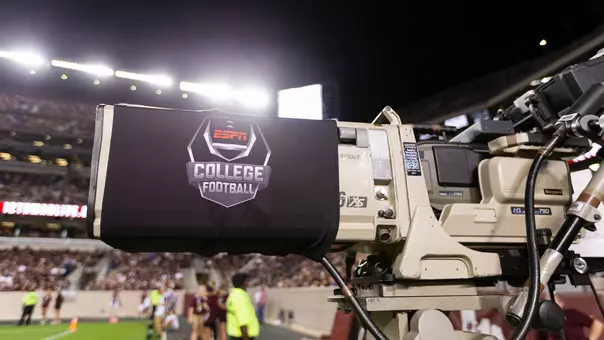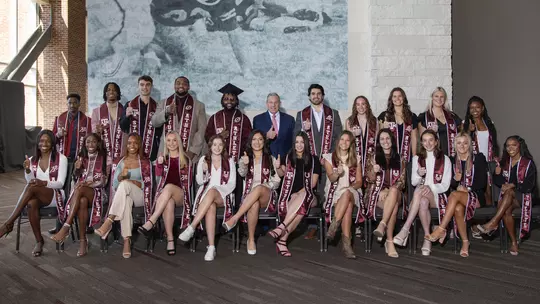
Putting Student-Athletes First
As Faculty Athletic Rep, Paul Batista looks out for the well-being of Aggie student-athletes
Thomas Dick, Athletics Communications
A winding road has taken a county judge in rural Burleson County, Texas, to one of the most influential posts in the powerhouse Southeastern Conference.
Texas A&M’s Paul Batista was recently asked to serve on the SEC Executive Council - a role he would have never imagined he would have held 30 years ago.
The old saying goes “Find a job you love, and you will never work a day in your life.”
Batista, Texas A&M’s faculty athletics representative (or 'FAR'), has lived out that old saying in his life as a sport law professor.
He had his attorney-at-law shingle hanging as well as serving as a Burleson County judge in 1991 when he made a life-changing decision.
“I had been practicing law for about 15 years and really enjoyed it,” Batista said. “But I started thinking about ‘do I want to do this for the rest of my life?’ I got to thinking about what I really enjoyed. Serving on the alumni board of one of my alma maters, I really enjoyed being on college campuses. I love sports and I love the law. I thought it would be really interesting to teach a sport law class at a university.”
Batista was living in Caldwell at the time, so Texas A&M was an obvious choice for a sales pitch. As it turns out, the University’s Health and Kinesiology Department was starting up a Sport Management program in 1991 and Batista’s idea for a course fit perfectly in the curriculum. He taught part-time as an adjunct for seven years and was enjoying it immensely.
“I thought ‘I think I would like to do this full-time for the rest of my career,’” Batista said. “I was provided the opportunity to come on full-time in 1998. I chose not to run for re-election, and I’ve been here since.”
Batista established himself as an expert in the legal aspects of sport and his reputation put him at the forefront when Texas A&M was searching for a new FAR. Batista was working on a committee with Leonard Bierman, Speaker-Elect of the Faculty Senate at the time, who nominated him for the position, and his resume and background stood out from the rest. Former A&M President Michael K. Young appointed him to the position in 2016.
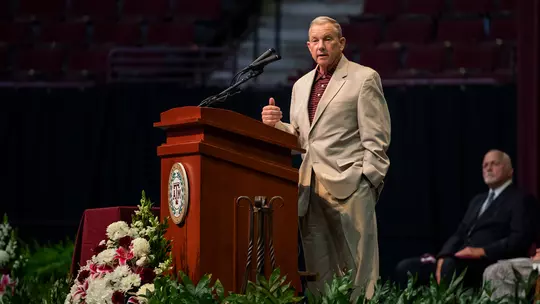
Since it began as the Intercollegiate Athletic Association of the United States in 1905, the NCAA has required every university to have a faculty athletics representative.
There are three main duties of a FAR. The first responsibility is to ensure the academic integrity and provide oversight of maintaining institutional control of the athletics program. Another obligation is serving as an advocate for the well-being of student-athletes. The final role is serving as a liaison from the university to the NCAA and the conference.
By all accounts, Batista is among the best in the country at handling all those chores.
“It comes down to credibility and communication,” Director of Athletics Ross Bjork said. “Paul is really, really proactive in terms of how he communicates, whether it's our intercollegiate athletic committee, whether it's our academic staff, whether it’s compliance. He’s always accessible to student athletes. We’ll go to a staff SAAC meeting or we’ll go to the student-athlete welcome back meeting, and Paul raises his hand and says, ‘I’m here for student-athletes.’ Having that visibility, that communication, is key to that success and making sure we maintain the academic integrity.”
One of the main prongs of the FAR task is looking out for the well-being of the student-athletes. Batista works closely with Deputy Athletics Director Joe Fields to ensure they have all the academic support they need. Every student-athlete has someone in the athletics department that they work with on their academics.
“Academic success is a pillar within the athletics department and through his consistent advocation, Paul plays a huge role in allowing us to meet that goal,” Fields said. “Paul’s impact on our student-athletes is not limited to academics as he is truly committed to ensuring our student-athletes are having a holistic first-class experience.”
A part of looking out for student-athlete well-being is staying up to speed on the policies of Texas A&M, SEC and the NCAA, sharing the knowledge with the student-athletes and teaching them how they are effected.
“Dr. Batista always stays up to date with what was going on regarding student-athletes,” Olympic gold medalist and eight-time track & field All-American Bryce Deadmon said, “whether that is regarding current or proposed student-athlete policies, rules, etc. Sometimes I would hang out with his office, and he would inform me on different rules and polices that were in place that were currently affecting student-athletes. He would also fill me in on ideas that were being proposed to help student-athletes or that would change the dynamics of NCAA sports completely. He is definitely a news source for what is going on with the NCAA and collegiate athletics. He is very informed about what is going on and he is a huge advocate for student-athletes.”
From the outside, the area where faculty athletics representatives shine their brightest lights is on the academic integrity of the athletics department. Texas A&M is heavily invested in academic success. Fields and his academic support office scrutinize everything the Aggies do in the classroom. Batista plays an integral role in the monitoring to ensure honesty in the academics.
“We do a deep dive to make sure there are no classes that are what many perceive to be ‘underwater basket weaving,’” Batista said. “We certainly don’t have any of that here at Texas A&M. We look at all the classes on campus and see if there is a clustering of student-athletes in any individual class. We look at majors to see if there is any clustering of majors that might be alarming.”
As a group they take a fine-tooth comb through any grade changes that come in to ensure they are legitimate corrections.
“The FAR role is comprehensive, and Paul is tasked with ensuring integrity throughout the athletics department,” Fields said. “I have always appreciated his proactive approach and forward-thinking. His perspective as a faculty member allows us to determine best practices and to ensure we are in compliance.”
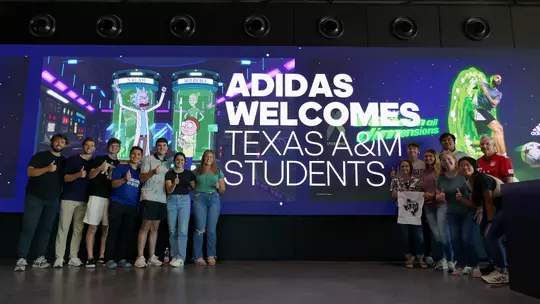
Almost a job unto its own, Batista serves as Texas A&M’s liaison to the SEC and the NCAA. He has an extensive meeting schedule that includes SEC faculty athletics representatives, the SEC leadership as a whole, the NCAA Convention and other NCAA meetings. If Texas A&M University President M. Katherine Banks is unable to attend meetings, Batista casts A&M’s vote as a member of the NCAA.
The work Batista does as a FAR is like adding a full-time job to his full-time job as a professor. Despite the long hours, he doesn’t hesitate in tackling the work that needs done. He cites the paramount significance of the duty.
“What keeps me going is it’s a really important position,” Batista said. “We need to make sure that our athletics department complies with our six core values. I can assure you it does, and it has been, and I expect that to continue. Ross (Bjork) has been very transparent. I’ve never asked him for anything that he didn’t immediately provide for me and more often than not, he sends me things before I even know I need them. I am very fortunate to work with a senior athletics staff like we have here, because not all FARs are quite as fortunate.”
At last spring’s SEC meetings in Destin, Florida, commissioner Greg Sankey sought out Batista to fill an opening on the SEC Executive Committee. As it was not a position Batista had sought out, he was both surprised and humbled by the privilege to serve on the committee.
“I thought I was really in trouble,” Batista said with a laugh. “People kept asking me if Commissioner Sankey had talked to me. The FAR at Ole Miss and Ross (Bjork) had both asked. Shortly thereafter I talked to the Commissioner and he said ‘I would like to ask you to be on the Executive Committee. Of course, it is a position that is voted on by the 14 SEC Presidents and Chancellors, but I would like to put your name into nomination.’ I was stunned and I was honored. I think it is really an important position for Texas A&M to be included in the leadership of the SEC. It’s really the first time we’ve had that opportunity in the 10-plus years we’ve been in the conference.”
The SEC Executive Committee’s main duty is approving the annual operating budget of the Conference and overseeing all financial and fiscal affairs of the Conference as administered by the Commissioner. The group oversees the staff and administration of the conference. At a recent SEC gathering Bjork jokingly reminded Commissioner Sankey that Batista was one of his bosses.
“I guess technically that’s true,” Batista said. “But my thought was ‘oh my gosh.’”
It is important for Texas A&M to have a voice in conference leadership, and this is an important step in the institution immersing itself in the league.
“We always say Texas A&M should have a seat at the table,” Bjork said. “Having Paul on the executive committee helps with that. He can have a full perspective as it relates to A&M and our stature in the conference. It lends credibility to everything that he stands for as well as everything that Texas A&M should be and can be within the SEC.”
The value Batista provides Texas A&M extends beyond serving as professor and faculty athletics representative. In the ever-shifting tectonics of college athletics, he provides guidance from a legal and scholarly aspect, especially in areas such as name, image and likeness.
“He brings a legal background, but also brings expertise from Sport Management and the academic side, where we’ve partnered with Mays Business School, which has been very beneficial,” Bjork said. “Having the ability to really funnel our ideas through Paul, given all the tentacles that he touches, is an important tool. He knows what’s happening nationally. He knows what’s happening in that space. He knows what the academic people are talking about, so it brings another layer of expertise and skill that is invaluable.”
While Batista teaches a wide array of courses, he currently teaches the Legal Aspects of Sport to undergraduates, sport law class to graduate students, as well as an athlete-agent class. He also spearheads a five-week study abroad program to Austria and Germany in the summer, where the program has associations with Adidas, Bayern Munich and other premier sport organizations in Europe. His involvement in the study abroad program encouraged him as he completed a Certificate of Advanced Studies in European Sports Law and Policy, from the Faculty of Law at the University of Leuven, Belgium.
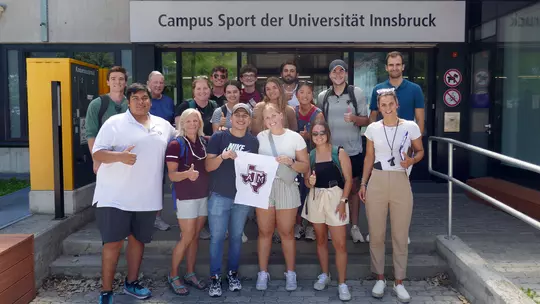
“I like the Legal Aspects of Sport the most,” Batista said. “Not only do I talk to the undergraduate students about that topic, but I try to talk to them about professionalism in their jobs. I hope that I can give them some nuggets based on my experiences that might help them in their career endeavors and personal lives.”
Through his work as a professor, Batista has connected with Aggies both student and non-student to provide an amazing educational experience.
“Even outside of my sport, Dr. Batista was a great professor,” Deadmon said. “I initially met him when I did a study abroad trip with him in the Summer of ’17. He did an outstanding job keeping the class interesting and engaged. He really did more than a good job of trying to make the material that we were learning applicable to what was currently going on.
“Dr. Batista is really down to earth and very approachable. I remember initially going on my study abroad trip with him leading the program and not knowing how the relationship would be with him and the rest of my classmates. He really took the time to get to know all of us on a personal level and really made our trip one of the most enjoyable memories of my life! I’m very happy I was able to take multiple classes with him throughout undergrad and also that I still have a good relationship with him to this day.”
In addition to his teachings in the classroom, Batista is deeply involved in research and studying. He has authored over 40 research publications and book chapters and he’s regularly invited to deliver his expertise around the globe, delivering nearly 100 presentations at conferences, seminars and law schools since 2000. He has a distinguished list of awards, including the Association of Former Students Distinguished Achievement Award in Teaching, the Montague Center for Teaching Excellence Scholar Award, the Texas A&M George H.W. Bush Presidential Library Foundation Excellence Award for Faculty in International Teaching, and the Betty van der Smissen Leadership Award, the highest award presented by the Sport and Recreation Law Association.
Batista also brings the perspective of the student-athlete. He was an infielder for the top-10 ranked Trinity University baseball squad in the 1970s, helping lead the Tigers to NCAA Regional Playoffs in 1971, ‘72 and ’73. He graduated from Trinity in 1973 with a bachelor’s degree in business administration. He earned his J.D. from the Baylor University Law School in 1976.
While he represents every student-athlete on campus, Batista is not afraid to admit he has a favorite sport. It goes back to his prior days on the diamond.
“It’s baseball. My mother told me when I was not even able to walk yet, she would put me in the crib and I would be fussy until she’d drop some sort of ball in there. I’d just play with it and roll it around. I don’t think I’ll ever get over my love affair with baseball. I’m fascinated by the intellectual cat-and-mouse game between the pitcher and the batter.”
When you have a job that you don’t consider a job, the thought of retirement is never in the forefront. He recently signed on with President Banks for another three years serving as faculty athletics representative and he is excited about the upcoming summer’s study abroad trip.
“I’m the luckiest guy in the world because I never go to work,” Batista said. “I come here even during the summer and Christmas break. I come to my office and there is always something that intellectually challenges me. So every morning I get up I’m looking forward to coming to the office and being involved in this university and with these students. As long as, I am physically and mentally able to do this, I intend to keep doing it.”
